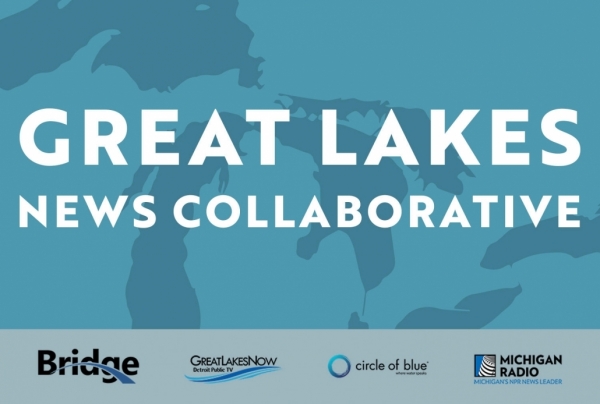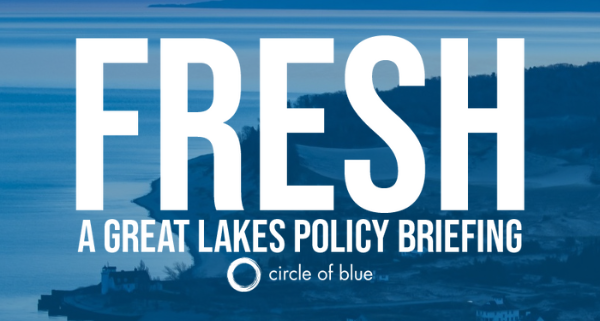Fresh, October 3, 2023: Wisconsin DNR, Despite Pushback, Puts Waterway Health First
October 3, 2023
Fresh is a biweekly newsletter from Circle of Blue that unpacks the biggest international, state, and local policy news stories facing the Great Lakes region today. Sign up for Fresh: A Great Lakes Policy Briefing, straight to your inbox, every other Tuesday.
— Christian Thorsberg, Interim Fresh Editor
This Week’s Watersheds
- Environmental groups criticize as inadequate the U.S. EPA’s approval of a ‘controversial’ Ohio EPA plan to limit algal blooms in Lake Erie.
- A set of bills introduced in Michigan aimed at making water more affordable across the state would raise residents’ bills by $2 per month.
- Wisconsin’s Department of Natural Resources has changed an antidegradation policy to bolster protections for the state’s waterways.
- Growers and consumers, especially dairy farmers in the drought-hit Midwest, await the future of the Farm Bill, which expired with the new federal fiscal year.
Lake trout subsistence fishing is once again possible for the Fond du Lac Band of Lake Superior Chippewa, who netted the fish for the first time in 160 years.
“This was a huge occasion to celebrate that the lake can now sustain a tribal subsistence fishery. And this is culturally important for the community to bring back this subsistence fishery for traditional food.” — Eric Torvinen, a fisheries biologist with the band’s natural resources division.
The resurgence of lake trout in Lake Superior has made subsistence fishing possible once again for the Fond du Lac Band of Lake Superior Chippewa. For the first time in 160 years members participated in the ancient tradition, the Duluth News Tribune reports. Members caught 323 fish over three nights in August.
The Fond du Lac Lake Superior Subsistence Fishing Program, still in its early stages, is strictly limited to those who apply for and are granted a permit. The band continues to work with the Minnesota Department of Natural Resources and engage in government-to-government discussions about the species and its waters.
Tribal elders are expected to begin netting in October.
Fresh from the Great Lakes News Collaborative

- Consumers Energy tells Michigan residents it needs partners to keep hydro dams — Bridge Michigan
- National Wildlife Federation alleges Enbridge Energy improperly obtained a wildlife habitat designation — Michigan Radio
- Great Lakes EPA office reaffirms 2030 cleanup goal for Detroit River, other contaminated sites — Great Lakes Now
The Great Lakes News Collaborative includes Bridge Michigan; Circle of Blue; Great Lakes Now at Detroit Public Television; and Michigan Radio, Michigan’s NPR News Leader. We work together to produce news and information about the impact of climate change, pollution, and aging infrastructure on the Great Lakes and drinking water. This independent journalism is supported by the Charles Stewart Mott Foundation. Find all the work here.

Wisconsin’s Waters Get Priority From State’s DNR
Large livestock farms and municipal and industrial facilities will need to comply with a new antidegradation policy set by the Wisconsin Department of Natural Resources, should lawmakers approve the provision, Wisconsin Public Radio reports.
The policy puts Wisconsin in line with the U.S. EPA’s 2015 ruling. The state’s DNR can “only approve a new or increased discharge that would significantly lower water quality when a review of alternatives shows it’s necessary to support important social or economic development.”
The Wisconsin Manufacturers and Commerce has argued that these changes will cost businesses and taxpayers $56.7 million within two years — which would require legislative approval — and that 82 percent of Wisconsin’s waters are already healthy.
Supporters of the new policy say that its measures are essential to preserving and maintaining clean waters. “I think we’ve learned the hard way that an ounce of prevention is worth a pound of cure,” Evan Feinauer, staff attorney for Clean Wisconsin, told Wisconsin Public Radio.
In the News
Water Affordability: A new bill package introduced in Michigan, aimed at addressing water affordability across the state, would slightly increase residents’ monthly water bills in order to fund a program for those struggling to pay, WDIV-TV Detroit reports. The $2 monthly increase — $24 per year — would be expected to generate $70 million annually statewide for those behind on their water bills. But critics argue that existing programs, such as a water bill assistance fund from the Great Lakes Water Authority, already contribute to this effort, making this new proposition redundant.
In context: High Cost of Water Hits Home
Farm Bill: Growers are anxiously awaiting the next iteration of the Farm Bill, a federal legislative package passed every five years that addresses “crop subsidies, crop insurance, nutrition assistance, conservation programs and much more,” Modern Farmer reports. The most recent version expired on September 30. Congress narrowly avoided a government shutdown but failed to pass a new Farm Bill that would be in effect through 2028. Modern Farmer reports that dairy farmers are particularly exposed should particular programs lose out on long-term funding. Congress is expected to take up the legislation by the end of the year.
Looking Ahead
Erie Algal Blooms: The EPA is moving forward with a new plan to reduce the amount of phosphorus flowing into Lake Erie via the Maumee River, a process that contributes to the formation of toxic algal blooms, Cleveland.com reports. But the decision has divided environmental advocates, many of whom criticize the plan’s methods: limiting a “total amount of phosphorus,” rather than focusing on “total dissolved phosphorus,” the substance that more efficiently leads to the creation of blooms. The plan is also dependent upon the state’s H2Ohio program, which encourages farmers to voluntarily reduce the amount of phosphorus runoff — though in the past “has not managed to reduce phosphorus levels.”
Upcoming Events
October 3-5 — 2023 Great Lakes Commission Annual Meeting — learn more
October 12-13 — Great Lakes Conference — learn more
October 16-18 — Great Lakes Beach Association Conference 2023 — learn more
Other News
Mackinac Island: The island is receiving $15 million from the Michigan Department of Environment, Great Lakes, and Energy for wastewater treatment plant improvements, UpNorthLive reports.
Ohio Erosion: Lakefront planners in Ohio are looking to curb erosion with climate-resilient construction projects, but still need to raise the necessary funds, Cleveland.com reports.
Christian Thorsberg is an environmental writer from Chicago. He is passionate about climate and cultural phenomena that often appear slow or invisible, and he examines these themes in his journalism, poetry, and fiction.






Leave a Reply
Want to join the discussion?Feel free to contribute!